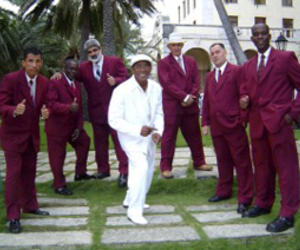Septeto of Cuba to bring el son
- Submitted by: manso
- Arts and Culture
- 03 / 26 / 2011

Septeto of Cuba to bring el son. Ernesto Portillo Jr. Arizona Daily Star Arizona Daily Star. Friday, March 25, 2011 12:00 am. COURTESY UAPRESENTS. Septeto Nacional will bring its famous sound to UApresents on Wednesday.
In Cuba's musical heart beats el son.The Cuban son is the sound of the island nation. But more than a sound or style, son runs deep in Cuban music, and life. It is history and life.
"The son is the flavor, cadence and melody which touches the heart," wrote in an email, Frank "El Matador" Oropesa, of Cuba's famed Septeto Nacional de Ignacio Piñeiro.
One of the most important interpreters of the Cuban son is the Septeto Nacional. It certainly is one of Cuba's most enduring cultural ambassdors. The group will perform Wednesday at UA Centennial Hall.
Piñeiro created his septet in 1927. Building on the traditional music of eastern Cuba, which was primarily performed by trios with a guitar and light percussion, Piñeiro expanded the structure and sound by adding more instruments and, critically, a trumpet.
"With poetic lyrics this made the son richer and more danceable. From that change the Septeto Nacional became popular worldwide with songs which have become memoralized like 'Echale Salsita', 'Suavecito,' 'Donde Andabas Anoche' and many more," Oropesa wrote.
The song "Echale Salsita" is considered by some musicologists to be the first tune to include the word "salsa" which today is the musical umbrella term for various forms of Afro-Cuban music.
But the Septeto Nacional is not a contemporary, trendy salsa band but a dyed-in-the-wool Afro-Cuban son ensemble.
"Piñeiro, the poet of the son, created musical styles like the guajira son, the guaguanco and others," wrote Oropesa. Piñeiro wrote more than 400 songs.
After Piñeiro established his septet with its integral son, the sound quickly went global. In 1930, Don Azpiazú and his Havana Casino Orchestra recorded the son styled El Manicero," written by Cuban composer Moisés Simón. The song, known in English as "The Peanut Vedor," became an international best seller.
The Cuban septet is now in its fourth generation. Its seven members range in ages from 44 to 70. On stage the group will add a dancer and singer.
While U.S. trade and immigration laws make it difficult for Cuba-based musicians and artists to travel to the United States, the septet performed in this country in 2009 and 2010.
While the son has been eclipsed in Cuba with contemporary, more energetic sounds of salsa and timba, the son remains at the core of Afro-Cuban music worldwide. Musicians today, whether performing Latin jazz, salsa or big band Afro-Cuban numbers, consider the son the heart of their sound.
If you go
Septeto Nacional Ignacio Piñeiro de Cuba
• Presented by: UApresents.
• When: 7:30 p.m. Wednesday
• Where: Centennial Hall, 1020 E. University Blvd. on the campus of the UA
• Cost: $15-$38.
• Reservations/ information: 621-3341
Source: Arizona Daily Star
Comments